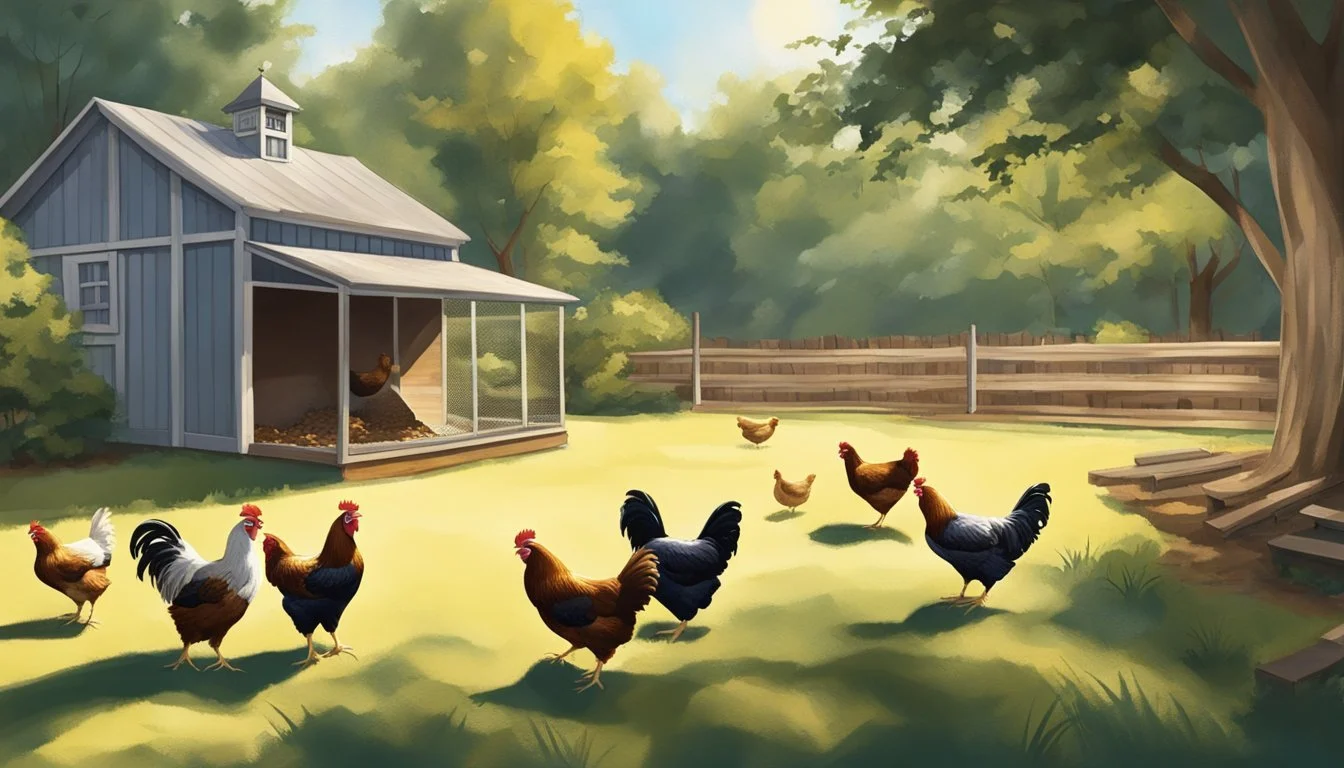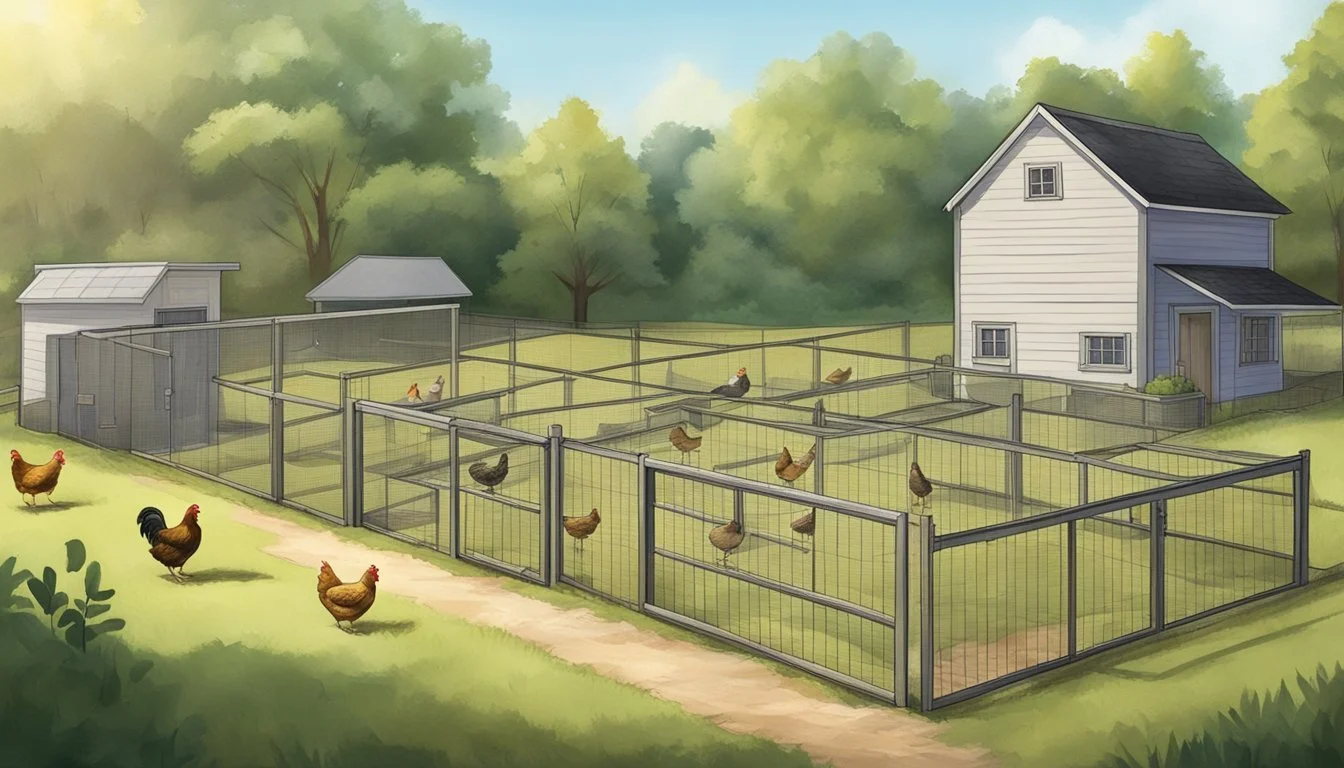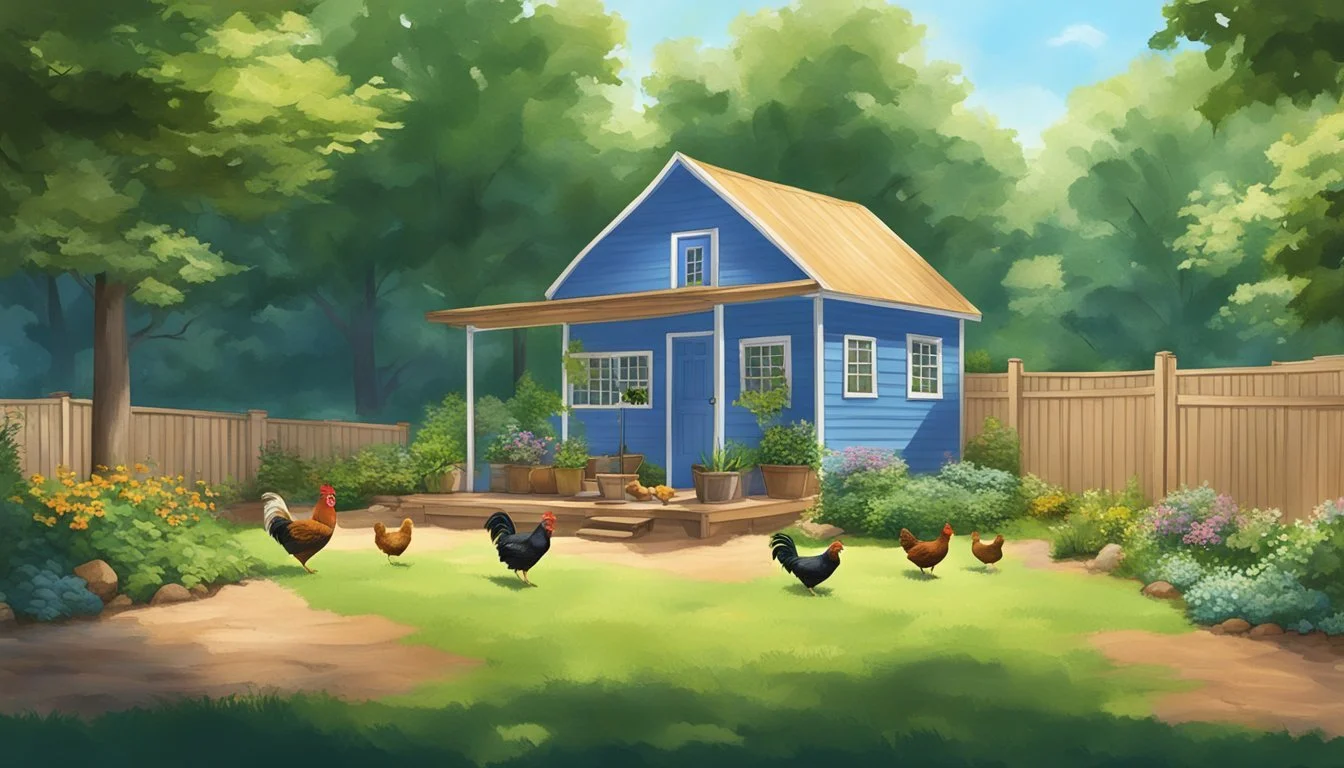Raising Backyard Chickens in Columbus, GA
Essential Tips for Beginners
Raising backyard chickens has become increasingly popular in Columbus, Georgia, as more residents seek sustainable lifestyles and locally sourced food. Columbus city ordinances allow for the keeping of chickens within certain limits, making it essential for beginners to understand the legal framework. Specifically, the local law permits 32 chickens per acre for properties larger than two acres, and coops must be located at least 100 feet from any lot line. This regulation ensures that neighbors are not disturbed by the presence of the animals and that the chickens have ample space to roam and thrive.
Beginners in Columbus interested in learning about raising backyard chickens should prioritize educating themselves on proper care and management. Essential knowledge includes understanding nutritional needs, coop maintenance, protection from predators, and recognizing common poultry diseases. Complying with local ordinances not only supports community harmony but also promotes the well-being of the chickens.
Exploring the world of backyard chicken raising in Columbus offers hobbyists and food enthusiasts alike a rewarding venture. It presents an opportunity for community engagement, as experienced poultry keepers often share insights and best practices. As the trend continues to grow, it reflects Columbus residents’ commitment to responsible urban agriculture and the enjoyment of rearing chickens.
Understanding Local Chicken Laws in Columbus, GA
Residents of Columbus, Georgia interested in raising backyard chickens must navigate a series of local chicken laws to ensure compliance with municipal regulations.
Zoning Regulations and Restrictions
In Columbus, GA, zoning regulations dictate where chickens may be kept. It is imperative for residents to confirm with local zoning authorities before setting up a coop. Typically, there are restrictions on how close structures for housing chickens can be to property lines.
Chickens Allowed and Limits
Columbus regulations allow residents to keep chickens on their property, but there are limits to the number of chickens that can be raised. Properties over two acres have a base allowance, with the possibility of keeping additional chickens per acre. Homeowners must abide by the set framework to avoid penalties.
Roosters and Noise Ordinances
While backyard chickens are generally permissible, roosters may fall under noise ordinances. These rules are in place to maintain neighborhood peace. Residents should verify whether roosters are allowed and if any specific noise regulations must be followed to prevent potential disputes or violations.
Health and Safety Requirements
The health and safety of backyard chickens is not only important for the animals but for the community as well. Prospective chicken owners should adhere to guidelines provided by the local animal control and public health departments. These regulations are designed to prevent the spread of diseases and to ensure a clean and safe environment for both the chickens and the local residents.
Choosing the Right Chicken Breeds
When selecting chicken breeds for a backyard coop in Columbus, GA, it's crucial to consider egg production, climate suitability, temperament, and breed-specific care needs.
Egg Production and Breed Selection
One must assess breeds based on their egg-laying capacities. For robust egg production, the Lohmann Brown is a highly efficient layer, producing over 300 eggs annually. However, local enthusiasts may also consider breeds like the Rhode Island Red, which offers a balance of good egg yield (250-300 brown eggs per year) and meat.
Breed Egg Color Annual Egg Count Lohmann Brown Brown Over 300 Rhode Island Red Brown 250-300 Olive Egger Olive green Varies
Temperament and Climate Considerations
The temperament of a breed can greatly affect the harmony within a coop. Breeds such as Rhode Island Reds are known for their generally docile nature. When accounting for climate, Columbus, GA, is prone to both hot summers and relatively mild winters. Therefore, breeds like the Andalusian, which thrives in heat, should be avoided due to their susceptibility to frostbite.
Breed-Specific Health and Care
Each breed has distinctive health needs and care requirements. It is essential to provide shelter that accommodates the climate tolerance of the selected breeds. For example, Cochins are suited for colder areas and would need adequate protection from extreme heat. Prospective keepers should research and prepare to meet the specific care needs of their chosen breeds.
Designing and Building a Suitable Coop
When building a chicken coop in Columbus, GA, one must consider the local climate, potential predators, and the comfort of the chickens. Ensuring a design that allows for ample space, adequate ventilation, and secure areas for roosting and laying is essential for the health and productivity of the backyard flock.
Sizing and Spacing for Comfort
Ideal coop dimensions depend on the number of chickens. They require at least 3-4 square feet per bird inside the coop and about 10 square feet per chicken in an outdoor run. Coops should be tall enough to allow for easy cleaning and maintenance, with a minimum height of 6 feet being beneficial for human access.
Protection Against Predators
In Columbus, common predators such as raccoons, hawks, and foxes necessitate security measures. Coop security can be enhanced by using hardware cloth instead of chicken wire, securing all potential entry points, and including locks on doors. The coop should be well-fortified, with the mesh buried at least 12 inches below the ground to deter digging predators.
Ventilation and Maintenance
Proper ventilation is crucial in the variable Columbus climate to prevent respiratory issues. Ventilation holes should be covered with predator-proof mesh. Coop cleanliness is another vital aspect, so designing with materials that are easy to clean and creating a layout that allows access to all areas will simplify maintenance tasks.
Nesting Boxes and Chicken Run
Each hen requires a nesting box that is approximately 12x12x12 inches for comfortable egg laying. These should be filled with suitable bedding, like straw or wood shavings. Chicken runs need to offer protection and space for chickens to roam. Runs should be covered with a strong mesh and include shaded areas for hot days, as well as places for dust baths.
Feeding and Caring for Your Chickens
Providing the right nutrition and maintaining a clean environment are crucial for the health and productivity of backyard chickens in Columbus, GA.
Nutrition and Chicken Feed Types
Chickens require a diet rich in proteins, amino acids, vitamins, and minerals. The specific types of feed will change as they grow, with starters for chicks 0-8 weeks old containing 18-20% protein to support their rapid growth. As poultry matures, they should transition to grower feeds with slightly reduced protein content of 16-18%. Finally, at 15-18 weeks, owners can switch to finisher feeds or layer rations as birds begin to lay eggs, necessitating diets with adjusted calcium for shell production.
Starter Feed (0-8 weeks): 18-20% protein, crumbles
Grower Feed (8-14 weeks): 16-18% protein
Finisher Feed (15-18 weeks): 16% protein
Essential amino acids like methionine and lysine are a must-have in chicken feeds, along with vitamins A, D3, B12, and E. Minerals such as copper sulfate and phosphorus, along with fiber, help maintain a balanced diet to support chickens' digestion and overall health.
Managing Health and Disease
Consistent observation of the flock can reveal early signs of disease, facilitating timely intervention. Backyard chicken caretakers must be vigilant for symptoms like lethargy, reduced egg production, respiratory issues, or unusual droppings. Common poultry diseases in Columbus, GA include respiratory infections and parasites which can often be prevented with proper vaccination and regular deworming. Clean water and feed, along with biosecurity measures, reduce the risk of disease transmission within the flock or from wild birds.
Daily Routines and Cleaning
Daily care routines ensure chickens stay healthy and their living conditions are conducive to a productive life. The following daily tasks are recommended:
Fresh Water: Replace water daily to prevent the spread of disease.
Feeding: Provide the correct type of feed in clean containers.
Observation: Check for signs of distress or illness.
Egg Collection: Gather eggs to keep them clean and reduce egg-eating behavior.
Cleaning: Remove droppings and turn the bedding to minimize odor and flies.
A thorough cleaning of the coop should be conducted weekly. This includes replacing bedding, cleaning feeders and waterers, and examining perches and nesting boxes for any signs of wear or infestation.
A well-maintained environment and balanced diet play a pivotal role in the health and productivity of backyard chickens. Through diligent feeding routines, disease management, and consistent sanitation practices, caretakers can ensure the well-being of their flocks in Columbus, GA.
Raising Chicks to Healthy Adults
Successfully transitioning chicks into healthy adult chickens requires close attention from the moment the eggs hatch. Vital considerations include proper initial care, understanding their growth phases, and integrating young birds with older flock members to ensure a cohesive community.
Hatching Eggs and Chick Care
When hatching eggs, it’s paramount to maintain the incubator at a consistent temperature of 99.5°F with a humidity level around 50-65%, adjusting to about 70-75% for the final days of incubation. Once hatched, baby chicks should be placed in a clean brooder with access to heat lamps or warming plates to keep them at a cozy temperature, reducing the heat by 5°F weekly until reaching ambient temperature.
Begin with a small number of chicks and a manageable ratio -- often start with at least three to ensure they have company, as chickens are social creatures. Equip the brooder with feeders and waterers that are chick-sized to prevent drowning and minimize waste, and provide a 18-20% protein starter feed for the first 8 weeks.
Growth Stages and Development
The growth of the chicks can be broken down into key stages:
0-8 weeks: Chicks require starter feed rich in protein to aid in their development.
8-14 weeks: Transition to a starter/grower feed with slightly reduced protein, around 16-18%.
15-18 weeks: A lower protein finisher at 16% is appropriate until they reach laying age.
Regular monitoring ensures they are developing correctly and are not exhibiting any health issues. Adequate space is necessary as they grow, with a general rule of at least 10 square feet per bird in their run once they start spending more time outdoors.
Integrating With the Flock
Introducing young chickens to an established flock should be done gradually. Isolation in an adjacent but separate space allows both old and new members to see and hear each other without direct contact, diminishing stress and aggression. After a few weeks, supervised interactions help ease the integration process. It’s also critical to maintain a balanced ratio of hens to roosters; typically, a safe ratio is around 10 hens for every rooster to prevent over-mating and stress among the birds.
Understanding the Responsibilities of Chicken Keeping
Raising backyard chickens requires consistent dedication and knowledge of poultry care. The responsibilities extend beyond feeding and egg collection, encompassing time management and community engagement.
Time Commitment and Daily Tasks
Raising chickens in Columbus, GA involves daily tasks essential for their wellbeing. The chickens must be fed at least once a day with a balanced diet, and their water supply should be refreshed regularly to maintain hydration. Cleaning the coop and run is vital to prevent disease, with a more thorough cleanup needed weekly. One must ensure the chickens have adequate space, with Columbus regulations stating 3-4 square feet per bird inside the coop.
Daily Tasks Description Feeding Provide a balanced diet Refreshing Water Clean and refill water containers Collecting Eggs Check nests for eggs Coop Maintenance Clean waste and refresh bedding
Preparing for Vacations and Absences
When planning a vacation, homeowners must arrange care for their chickens. One option is to recruit a local farmer or trustworthy neighbor to take over the daily tasks. Alternatively, chicken-sitters can be found through local Facebook groups or poultry care services. The caretaker should be briefed on proper routines and emergency procedures, ensuring continuous and proper care.
Engaging With the Local Chicken Community
Connecting with a community of chicken enthusiasts is beneficial. Local chicken-keeping groups on Facebook provide avenues for sharing tips, soliciting advice, and finding support. Active participation can lead to relationships with experienced keepers who can offer guidance on Columbus’s specific regulations and help with chicken-sitting during absences. A knowledgeable community acts as an asset, providing support and exchange of best practices.
Maintaining backyard chickens is a rewarding task, yet it demands substantial attention and understanding of local bylaws and community resources.
Benefits and Challenges of Backyard Chickens
Raising backyard chickens in Columbus, GA, offers residents the opportunity to enjoy fresh produce and companionship, but also comes with its set of specific responsibilities. The balance between the benefits and challenges is crucial for a successful endeavor.
Eggs, Pets, and Meat Production
Backyard chickens primarily provide a steady supply of fresh eggs, often with better taste and nutritional value than store-bought alternatives. Varieties like the Rhode Island Red and Leghorn are excellent layers. For those interested in meat production, breeds such as the Orpington can serve a dual purpose for both eggs and meat. Beyond this, chickens often become cherished pets, offering entertainment and educational value to families.
Eggs: Fresh, typically more nutritious than those from commercial sources
Pets: Provides companionship, educational for children
Meat: Option for self-sustainability
Managing Expectations and Reality
However, prospective chicken keepers should manage their expectations. Chickens require a commitment to their care, including feeding, housing, protection from predators, and maintaining cleanliness to prevent disease. Zoning laws in Columbus must also be considered, as they dictate the number and type of chickens allowed.
Zoning Laws: Check local ordinances for legality and restrictions
Daily Care: Consistent feeding, watering, and coop cleaning are necessary
Predator Protection: Proper enclosures to safeguard against local predators
Chicken ownership in Columbus, GA can be both rewarding and demanding, with considerations for local climate, predator species, and urban density impacting the approach. Each chicken owner must weigh these factors carefully in their decision to raise backyard chickens.






